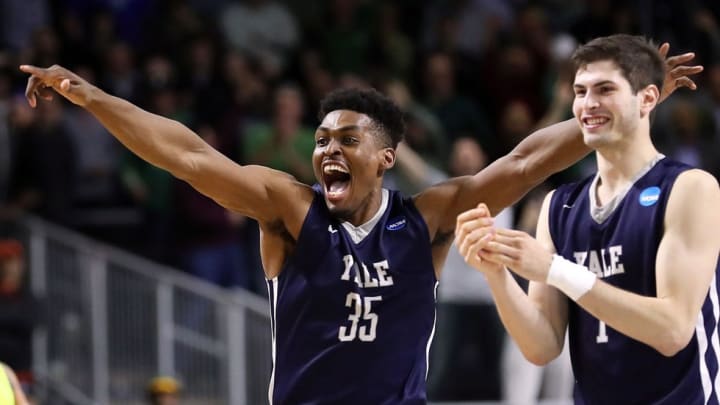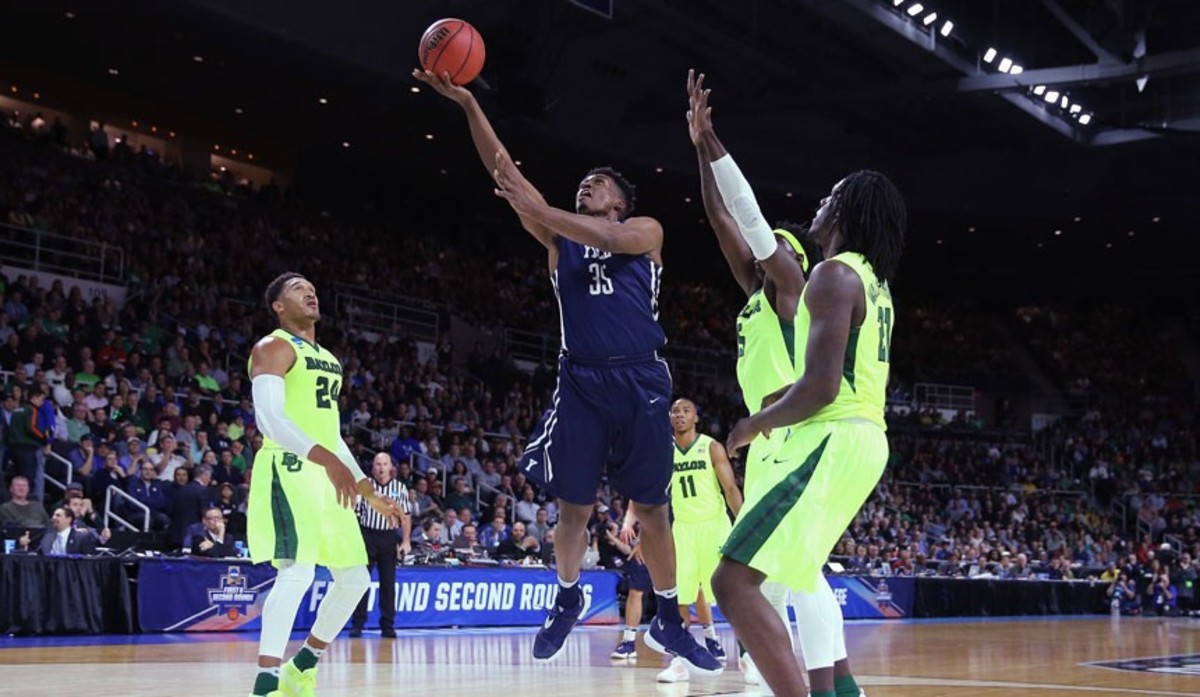The music of March Madness: Brandon Sherrod helps lead Yale into second round of 2016 NCAA tournament

[video: 13724941]
Late Thursday afternoon in Providence, R.I., with his team leading by two and just two seconds away from a historic NCAA tournament upset of No. 5 seed Baylor, Yale senior forward Brandon Sherrod stepped to the free throw line. Sherrod was a 59% foul shooter, but two swishes, and the icing of the game, would not have amounted to the most unusual thing he had done during his collegiate career.
Every so often during his first three years at Yale, Sherrod completed post-practice meals by pulling his 6' 6", 240-pound body up to a piano. His deep, sonorous voice singing John Legend's "Ordinary People" filled the wood-paneled dining halls. The power forward moonlighted as a power balladeer. "All the girls would go over there and swoon," says Sherrod's teammate, Justin Sears.
Music is Sherrod's first love. The Bridgeport, Conn., native didn't begin playing competitive hoops until he was a freshman in high school, when he weighed more than 300 pounds. But growing up he had been singing and playing instruments, largely in church, with his three younger sisters—one of whom, Chynna, recently appeared on the final season of
American Idol. His father, Rick, is the postmaster in nearby Norwalk. His mother, Sandy, is a special education teacher.
THAMEL: Yale upsets Baylor to win first NCAA tournament game
At Yale, music took a back seat to basketball. Sherrod became a solid, if unspectacular, contributor to a Yale team that longed to break an NCAA tournament drought that stretched back to the 1961–62 season. That would mean winning an Ivy League that had historically been dominated by Princeton and Penn, and more recently by Cornell and Harvard. As a junior in 2013–14, Sherrod averaged 6.8 points, on 42.8% shooting, and 4.3 rebounds. Yale finished second behind Harvard.
Two Februarys ago, Sherrod secretly tried out for a different sort of team: the Whiffenpoofs, the oldest and most famous collegiate a cappella group in the country, whose alumni include Cole Porter and Prescott Bush and whose 14 male seniors usually withdraw from school for a year to travel the world and perform. During his 10–minute audition, he sang "Ordinary People." He made it. When he told his teammates the news, they all said that they would never forgive him if he declined his spot.
Yale coach James Jones had been trying to push his team into the NCAA tournament since he arrived in 1999—he had finished second in the Ivy three times—and was at first less enthusiastic about the prospect of a year without his would-be senior. But Sherrod had chosen to attend Yale over other suitors such as Davidson and Stony Brook in part because of the coach's pitch. Says Jones, "When I recruit kids here, I tell them about what a wonderful place Yale is and all the great opportunities you have here."
"Uh, coach?" Sherrod told Jones. "Remember that thing you told me three years ago? It's time."
"I'd be a hypocrite to tell him, you can't do this," says Jones.
Sherrod had never before traveled to a foreign country other than Canada. Over his year with the Whiffs, he visited 26, soloing on "Operator" by Manhattan Transfer and "You Are the Sunshine of My Life" by Stevie Wonder on every continent but Antarctica. He watched the sun rise in Zanzibar. His rental car was swarmed by baboons in South Africa. He listened to Israel Prime Minister Benjamin Netanyahu speak in Tel Aviv. He kept in shape as best he could, running and finding a ball and a rim wherever he went, including at a naval base on the Galapagos Islands.
The Whiffenpoofs were in south Florida when Yale, having won a share of the Ivy League led by Sears, the 6' 8" conference player of the year, reached a playoff game against Harvard last March 14 to determine the league's automatic tournament bid. Sherrod made calls until he found the one sports bar in Fort Lauderdale that would agree to devote a screen to the game. He spent it alternately screaming and explaining to his fellow Whiffs the difference between a travel and a double dribble. When Yale lost on a mid-range jumper with seven seconds left, Sherrod couldn't help but wonder if things might have been different had he been on the court. "Maybe I would have contested that shot, gotten a crucial rebound," he says. "Obviously, you like to think like that."
His passport full, he returned to campus this fall. Then something unexpected happened. "He's been better than ever," says Jones. "He's played like the best player in the league."
The erstwhile role player emerged as a leader, a fierce—if undersized—inside presence whom teammates compare to DeJuan Blair and Zach Randolph, and even Charles Barkley, albeit without the perimeter game. His seasonal averages nearly doubled, to 12.5 points and 7.1 boards. He racked up eight points and eight rebounds in the first half of a November game against Duke before foul trouble pinned him to the bench. "I want to hear you sing," Coach K told him during postgame handshakes.
Once league play began in January, the Whiff simply couldn't whiff. On Jan. 22, against Brown, he went 9–for–9 from the field in a 90–66 rout. The next weekend he shot 7–for–7 in a blowout of Penn, and then 8–for-8 in a narrow victory over Princeton. The weekend after that, he hit his first six tries against Columbia. That's 30 straight field goals, an NCAA record. "He hit some tough ones, and he hit some bunnies," says Sears, now a senior. "But that's a testament to his focus. I know I could never to it. I get lackadaisical."
Sherrod's year off gave him many things other than a renewed focus on basketball. It gave him time for his body to recover from injuries that had bedeviled him over his first three years. It gave him a newfound self-sufficiency and confidence, after having explored the globe. It also gave him a more nuanced understanding of how to successfully operate within a group, and to rely on his teammates.
"In a capella, if your group does not sound good, you're not going to sound good, no matter how dope your solo sounds," Sherrod says. "That dynamic is huge. It's all about harmony—trying to be on the same page, whether it's with music or on the court."
Sherrod ranked fifth in Ivy League play in scoring (15.8 points per game), eighth in rebounding (6.7) and second in field goal percentage (64.4%). His, and Yale's, season seemed a fairy tale until Feb. 10. It was then that the team's sharpshooting captain, Jack Montague, was expelled due to what the school later revealed to be to an alleged incident of sexual assault against a fellow student. Montague, who has not been charged with a crime, has maintained his innocence, and this week said through his lawyer that he plans to sue the university. But Yale's campus was roiled, in part because of the team's backing of him. Before a Feb. 26 game against Harvard, the players, including Sherrod, wore warmup shirts printed with a tribute to Montague. The team subsequently apologized for giving Montague its public support.
As controversy swirled, Yale finished 22–6 overall and 13–1 in the league, one game ahead of Princeton. It clinched its long-awaited tournament berth on March 5.

Jim Rogash/Getty Images
While Yale, like all Ivy League schools, does not award athletic scholarships, Sherrod says that almost 90% of his tuition is covered by financial aid. "These opportunities are just so wild to me," he says. "Being able to go to a prestigious university, travel the world. Me, an inner city Bridgeport kid, with a dad who didn't have a dad growing up, and a mom and dad who don't have great means."
Sherrod, a political science major, is writing his senior thesis on the inefficacy of charter schools in Bridgeport, and aspires to be the troubled city's mayor. Sherrod and Sears both live in a small apartment building, a five-minute walk from Yale's Payne Whitney Gymnasium, that is now almost entirely populated by basketball players and former Whiffenpoofs, connected by Sherrod. "They'll hang out and sing, and I'll just listen to them," says Sears. "If I ever need to experience some new things or meet some new people, I just follow that dude. He's just a quintessential renaissance man."
Music, though, is again a secondary interest for Sherrod. This season, he taped a piece of paper over his bed, which was the last thing he saw before he went to sleep after returning from those jam sessions. On it he had printed the years 1961–62. He took the sign down before the Baylor game, with Yale's streak of appearances without a tournament berth broken. On Thursday, with those two seconds left, the 59% foul shooter—who had sung around the world and who, despite foul trouble, already had eight points and six rebounds against Baylor's massive front line—coolly nailed both his free throws, to give the Bulldogs a 79–75 upset. It was Yale's first-ever tournament win and, with a second round rematch against Duke and Coach K scheduled for Saturday, there were no past accomplishments left to be surpassed. Sherrod and his teammates were composing an entirely new score.
